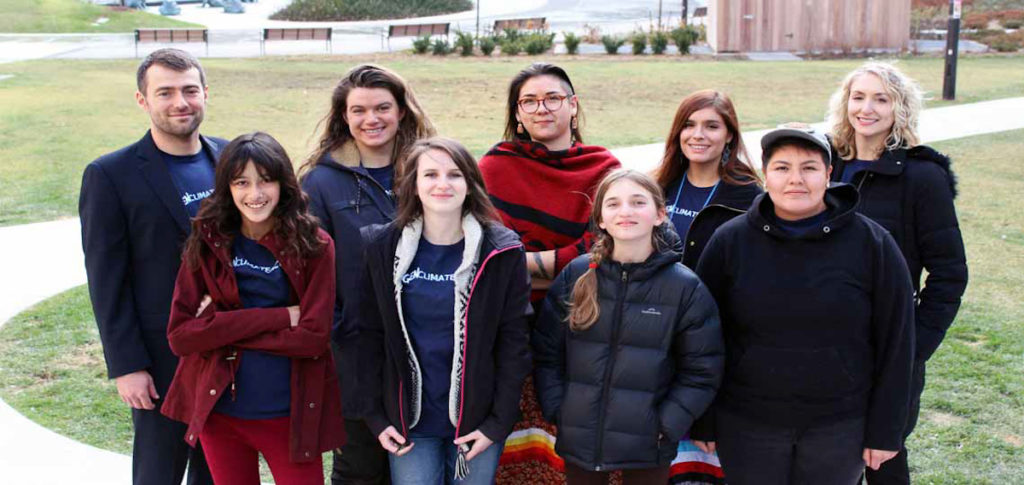Over the past year, we’ve become increasingly aware of the disastrous impacts of climate change in Canada. Last summer, in a matter of minutes, the town of Lytton, B.C. was wiped out as a wildfire surged through the homes of residents during a record heatwave. That same heatwave resulted in the deaths of at least 595 people in B.C. Later in the fall, the province was hit by flooding that killed 1.3 million farm animals. In the Prairies, local farmers faced devastation as droughts impacted their livelihoods. In Ontario, wildfires covered the province in choking and dangerous smoke.
As the climate crisis rages, more people in Canada are demanding action from governments and political leaders on climate change. People want those in power to step up to the mark and take bold and ambitious steps to tackle the climate crisis.
But we are literally running out of time to reduce emissions and face down the climate emergency.
At the forefront of this climate fight are young people. They have marched in the streets and organized in their classrooms to fight for greater action on climate change.
They are also increasingly turning to the Courts as a last resort, seeking to hold governments to account for failing to do enough to secure a safe and sustainable future for their generation. Thankfully, 2022 could be a historic year for young people’s climate litigation in Canada.
Mathur et. al.
In November 2019, seven young Ontarians launched Mathur et. al. v. Her Majesty in Right of Ontario, a legal challenge of the Ontario government’s decision to significantly weaken the province’s 2030 climate targets.
When the Ontario government was elected in 2018, it repealed what were considered to be relatively strong science-based greenhouse gas reduction targets for 2020, 2030 and 2050. The provincial government then replaced these targets with a single, significantly weaker 2030 target that would allow dangerous levels of emissions to continue over the next decade.
Backed by Ecojustice, Sophia, Zoe, Shaelyn, Alex, Shelby, Madi and Beze are arguing that by reversing climate ambition in the province, the Ontario government violated their Charter rights to life, liberty, and security of the person. By weakening the province’s climate targets, the provincial government is increasing the risk of events like those we witness in the past year becoming even more common.
The science is clear – if we want to avoid a climate catastrophe, we need to reduce emissions to make sure that the world prevents warming above 1.5 degrees Celsius.
Despite repeated attempts by the Ontario government to have this case thrown out, these young clients refused to back down. In a historic ruling, the courts completely dismissed a motion to strike by the provincial government to stop the case from moving forward.
In September 2022, these seven young Ontarians will be heading to the Ontario Superior Court to argue that the Ontario government violated their Charter rights by weakening the province’s climate action.
Why could this case be significant?
This case is historic because it is the first climate Charter litigation to make it to a complete hearing on a full evidentiary record in a Canadian court.
When the Ontario Superior Court dismissed the provincial government’s attempt to stop this case, it made a landmark ruling in Canada. For the first time ever, a Canadian court ruled that fundamental rights protected under the Charter can be threatened by climate change and citizens have the ability to challenge a Canadian’s governments action on the climate crises under the highest law in the land.
Now, in a first for Canadian legal history, a government’s record of climate inaction will be put on trial.
Like in many places around the world, it is young people who are leading from the front.
In Germany, New Zealand, Portugal and Ireland, young people have gone to court to demand that governments step up to the mark and do more to secure a safe and sustainable future for them and future generations.
Legal challenges of climate inaction have become a powerful tool for young people to have their voices heard and demand that older generations do more to protect their future. They are literally in court fighting for their futures, and the futures of generations to come.
That is why Mathur et. al could be such a crucial case. Not only does it provide the opportunity for young people to have their voices heard on climate change in a court of law, but it could also set an important legal precedent on climate change in Canada.
If successful, the court could strike down Ontario’s 2030 climate target for being weak and ineffective and mandate the provincial government to set a stronger target in line with what the science tells us is necessary to limit warming to 1.5 degrees Celsius.
If Sophia, Zoe, Shaelyn, Alex, Shelby, Madi and Beze win their case, they could help establish an important precedent across Canada and put all governments on notice that young people are ready to hold them to account for climate inaction.
What can you do to help?
We’re asking people like you to declare that you believe that this lawsuit is in the public interest. Before the hearing this September, Ecojustice lawyers intend to file a list of people from across Canada who believe that Mathur et. al. is in the public interest
When you add your name to our record, you’ll be joining the list of people that care about this case and stand with Sophia, Zoe, Shaelyn, Shelby, Alex, Madison, and Beze. You’ll signal that you believe it is vital for the courts to weigh in on whether the Ontario government’s actions have violated the Charter of Rights and Freedoms.







